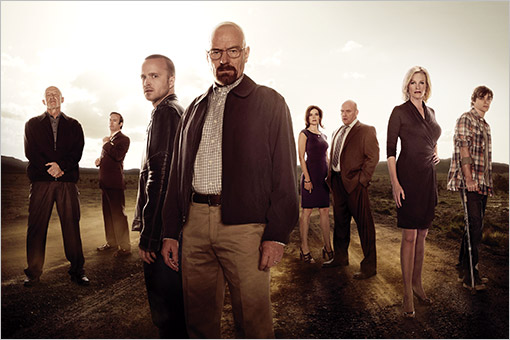
It’s 2 days after Father’s Day, but that’s close enough to unleash the demons in the time-honored tradition of harping on dads! I have great respect for fathers; however, anyone can be a baby-daddy, but it takes a man to be a father. A theme among many villains and antagonists is “daddy issues.” Demons springing from the actions or inaction of a father drive the antagonist to A.) become the villain they are today or B.) become a worse villain.
That said, there are actually villains and antagonists who are very good fathers. They’re rare, but they exist. These people have either overcome the demons that their fathers saddled them with or have used them to make them better dads.
We’ll look at villains, villains’ dads, and villain dads in this post. Then we’ll see how we can cope with our own daddy issues.
Onward!
Heeeeere’s Johnny!
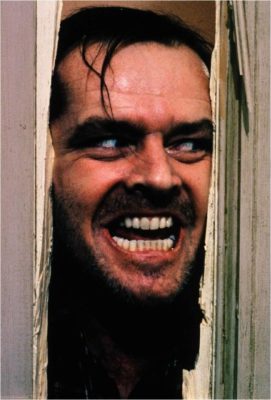
Or should I say Jack? Jack Torrance is the abusive, violent drug and alcohol addict from Stephen King’s The Shining and played by Jack Nicholson. While “all work and no play makes Jack a dull boy,” too much play makes him so unstable that he abuses his family, even breaking his young son’s arm. It also makes Jack fine prey for evil and eventually makes him a crazy-cicle frozen in the hedge maze.
Jack’s dear old dad was an alcohol and sex addict, which didn’t improve his abusive nature. He went so far as to beat Jack’s mother with a cane. Like father, like son.
Growing up in abusive family has permanent negative effects on kids. A kid who’s experienced abuse is more likely to have low self esteem, perform self-destructive behaviors, and eventually abuse his or her own family. Forming healthy relationships is difficult for these kids, which exacerbates their tendency toward substance addiction and abuse.
The abuse doesn’t have to be beatings, either. Abuse comes in many forms: neglect of needs, including emotional needs; emotional abuse such as mocking; abuse of pets; destruction of a person’s property; jealous control of all a person’s actions. The list goes on. Often the abuser leads the victim to believe it’s the victim’s fault and they deserve what they get. The victim eventually believes this lie, further harming their self-esteem and thus their ability to function in society.
Application:
A good therapist is very helpful in cases of abuse. The first step is to realize you’re not to blame. You didn’t deserve what happened. The second is not to hate your father. Hate hurts only you. Forgive. What does that mean? It means letting go of the bitterness that burns you. Forgiveness doesn’t mean letting them hurt you the same way. It means refusing to let the actions of the past continue to hurt you.
The third is recognizing the risk you have of becoming like what damaged you. Recognize any anger and violence in yourself. You don’t want to end up in a maze in winter, right?
I am your father

Everybody’s favorite Sith Lord Darth Vader has his own daddy issues. Sad thing is, he doesn’t have a dad. No, he didn’t walk out on little Anakin Skywalker, aka Darth Vader, and Momma Shmi. He just doesn’t have one. Midi-chlorians, the symbiotic organisms that enable people to “use the Force,” somehow conceived him. (I’m not a Star Wars aficionado, only a normal fan, so I don’t know either.) If that doesn’t give a person some identity crisis issues, I don’t know what will!
Besides not having a dad, period, Anakin grew up as a slave. Disempowered though he was, he became adept at using the Force and the socket set. He was a genius with mechanics, robotics, electronics, etc. When the Jedi ran across him and discovered his super-high midi-chlorian levels, they adopted him. Now he has the culture shock of leaving his mom and home to travel with wandering Jedi. After that, it’s off to the Jedi academy. Under all this change his anger began to take shape. He grew reckless and rebellious as time went on. It’s no wonder he became the perfect candidate for the Dark Side’s Sith Lords.
Application:
It’s an all too common state in our society that kids don’t know who their dad is. This uncertainty might make you blame yourself for not being better so that he would stay around. Or it might make you dislike your mom for not making a better choice in guys. It might even make you crave love to fill the gap your dad left. This craving can lead to very poor relationship decisions and coping skills.
There’s no quick fix here. Realize it’s not your fault. Realize that some of your actions might be subconscious attempts to “replace” dad. Realize you are your own person.
Kneel!
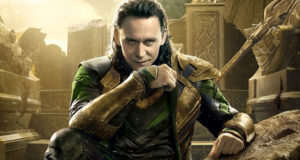
Loki, son of the Frost Giant Laufey and adopted son of Odin, may be the God of Mischief and Prince of Lies, but he struggles with demons that sprang from his adoptive father’s actions. When Loki was a baby, Odin fought the Frost Giants and killed Laufey. It what would appear to be to his credit that he adopted the fatherless Loki.
Fun fact: Odin’s father Bor died at the hands of the Giants’ magic. Odin could possibly resurrect/free him, but Odin doesn’t act. Bor appears to haunt Odin and tell him he’ll go a-haunting no more only if Odin will adopt the son a fallen king and raised it as his own. Days later, Loki fall into Odin’s lap. It turns out Bor isn’t Bor at all, but an illusion that a time-traveling Loki created to secure his future.
Thus we see that Odin acted purely out of self interest when he adopted the trickster. Loki grew up alongside Thor, Odin’s true son. Odin made his preference for the mighty Thor no secret, despite Loki’s skill with Asgardian magic and science. Thor would rule, Loki would not. Thor would be the warrior with the hammer, Loki would be the trickster with magic.
Favoritism has caused trouble throughout history. In the Bible, Jacob loved Joseph best. This caused his brothers to hate Joseph, eventually ending up with him a slave in Egypt. Though it’s been argued that parent favoritism is a myth, and though most parents won’t admit they like one child more than others, the perception of favoritism causes as much harm as its actual existence. Favoritism hurts the relationship of the siblings, provoking rivalry. It also hurts the self esteem of the less-favored child.
Application:
Did your dad play favorites? Realize that it’s not the fault of your sibling, but rather the failing of your dad. Then realize that he’s human, just like you. Don’t allow his doubt in you to hinder you. Use it instead to push you, but not to extremes. Don’t allow his disapproval, on the other hand, of your sibling to make you think little of them. Don’t allow favoritism to ruin your relationship with the person who’s your closest blood relative besides your parents.
There will always be the Hunter
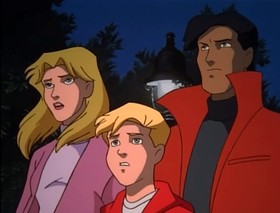
The Canmore siblings in Disney’s Gargoyles carry on the family trade of hunting Gargoyles, particularly Demona. It all happened after Gillecomgai (not an ancestor) ran afoul of Demona, a powerful female gargoyle who is ruthless and ferocious. She slashed his face, inciting his lust for vengeance. Then she semi-accidentally foiled his fight with/assassination attempt on a young Macbeth. (Yes, Shakespeare’s.) Prince Duncan took up the mantle, as he had ordered Gillecomgain to kill Macbeth. Duncan is the first in the Canmore hunter line. This happened 1000 years ago, roughly.
Long, 4-episode-story short, the tradition of hunting passed from father to child for centuries. In the present age, the most recent generation of hunters includes the siblings Jon, Jason, and Robyn. They lost their father Charles in 1980 when he faced off against the ageless Demona. They devoted their lives to becoming skilled hunters and tracking down Demona.
Family trades are fine, but bad things happen when the prejudices of the father infect and consume the children. Be they religious, ethnic, or otherwise, children learn biases from their society; however, family is the primary source. A strong bias can cramp if not cripple a child’s future. Usually the family discourages any questioning of the prejudice, which leads to decreased original thinking on the kid’s part. Aside from the damage it does to the kid, it also harms the people against whom the kid is biased. How do you think antisemitism and racism continue through the years?
Application:
Everybody has biases. Look at yours carefully. Now look at your father’s/parents’. How close are they? You might have even done the opposite, and become prejudiced against what your father/parents are or what they liked. For instance, you might be prejudiced against religion because they were externally religious. Be honest with yourself and judge your bias. Is it realistic? (Hint: probably not.) Realize it’s hard to fight against genes and upbringing but it is possible to win the fight.
He Who Must Not Be Named
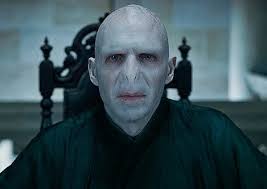
Lord Voldemort, aka Tom Riddle, grew up an orphan. His witch mother Merope Gaunt hooked up with wealthy Muggle Tom Riddle Sr. Then Jr. came along. But before young Moldy was born, Tom Sr. fled the scene. You can’t entirely blame him, as he was tricked into the relationship with magic and potions. When Merope stopped using potions, he promptly ditched. Shortly after Tom Jr.’s birth, she died, leaving him to live in an orphanage. The administration told him his mother was a circus worker.
The Gaunt family was known for producing powerful but unstable witches and wizards. Due to this genetic tendency toward evil, it’s hard to say how much of Voldemort’s villainous life nature sprang from blood and how much came from being orphaned while having no idea the true nature of his parents. I’m sure he knew his father abandoned ship, at least.
Abandonment by a father is a huge blow to a child. Kids internalize the abandonment, often feeling they’re to blame. This leads to trouble with intimacy and a low self esteem.
Application:
As with every problem, recognizing the root of the guilt, poor self esteem, and relationship problems is the key. Accepting that you’ve inappropriately taken the blame is the next step. While damage that’s happened can’t be undone, understanding the effect a father’s abandonment had or can have is critical to dealing with the fallout.
The Good in the Bad:
While many villains had terrible fathers and suffered from them, other villains and antagonists rose above their fathers’ demons.
Say my name
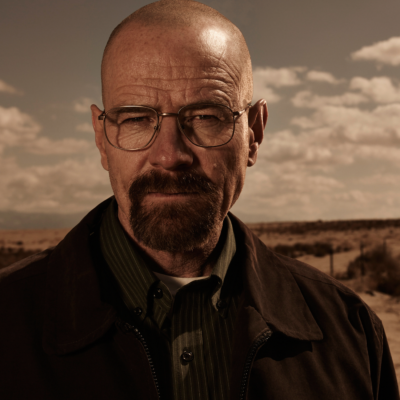
Let’s look at Walter White from Breaking Bad. He was haunted by memories of his dying father. Walt seeks to provide for his family by…cooking meth. Hey, it’s a good intention but a poor execution. Walt actually is a good father if you separate his “business practices” from his family. Yes, I’m aware that they couldn’t stay separate for long. However, he saw to it that his kids had money for college and what they needed to live on. He tried to spend time with them as often as he could. He also attempted to protect them when his business predictably crashed into his life. He went to extraordinary lengths to keep famiy and biz separate. His love of his children eventually drove a wedge between him and Skylar, his wife, as she knew what he was doing and feared for their safety.
I’m not overlooking his selfishness, immorality, or pride. I’m just pointing out that he did provide for his family, even if it required violence (and laser pointers).
Application:
Protect those you love. Provide for them. But be objective and try to recognize when you might be using them as rationales for your selfish actions.
Genius, billionaire, philanthropist, self-made man
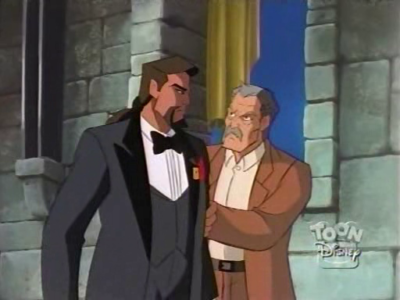
Moving into more normal territory, let me introduce David Xanatos of Disney’s Gargoyles. This genius of a businessman and long-term planner used time travel and the Illuminati to send himself a coin in the 1970s that would provide seed money for his multi-billion-dollar corporation. His father, Petros, believes a stranger sent the coin, which was worth $20K. David insists he’s a self-made man. Petros refuses to acknowledge the massive accomplishment that turning $20K into billions is, saying David would’ve been better off as a poor fisherman like his father. He even accuses his son of only caring about money, a blatant inaccuracy. Even after going back in time with David and seeing how all this came about, Petros is still not amused.
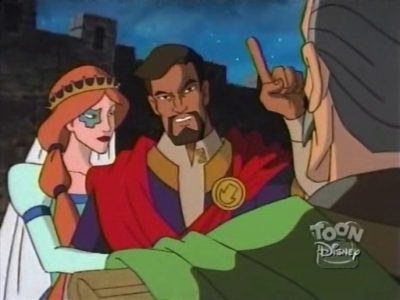
David takes the high road: he remains magnanimous toward his father. In addition, David becomes the best father to his own son, Alexander, that he can. Gargoyles creator Greg Weissman says that David will do his level best to be a good father and make sure Alex knows he’s loved.
David makes a conscious effort to avoid the errors of his father. If Petros did something as a father that David didn’t think was beneficial, David changed that in himself. This concerted effort to be a quality father has the desired effect. Though he’s an antagonist, David is one of the best dads around. His relationship with his wife, Fox, is also one of the healthiest you’ll find.
(In case you’re wondering, Petros admits later that he is proud of David because David stood up to the Lord of the Fey in order to protect Fox and Alex.)
Application:
What didn’t you like about your parents’ parenting? Fix it in your own life. What did you like? Improve it.
Don’t carry bitterness toward your father for his parenting style. As “revenge,” do an epic job of parenting your own offspring. Or your pet. Whatever fits!
In conclusion…
We all have our own demons from our fathers, even if they were pretty good dads. The key is to recognize the devils before they do more damage. There’s no shame in having daddy issues. The only shame is letting them control your life.
Further reading:
Got a devil on your back? So do villains
Hero or Villain? It Starts with Demons
Villainous Resilience: 15 Ways to bounce back like the Joker
How to be Villainously Positive: 18 ways with the Joker
Villainous opportunism: How to take advantage of every opportunity, Albert Wesker-style
Agree? Disagree? Let us know in the comments.
Perform your own villain assessments with the Villain Matrix. Use the Villain Matrix spreadsheet that comes free when you join the Research Team, where you’ll also get our newsletter with its exclusive updates and content.